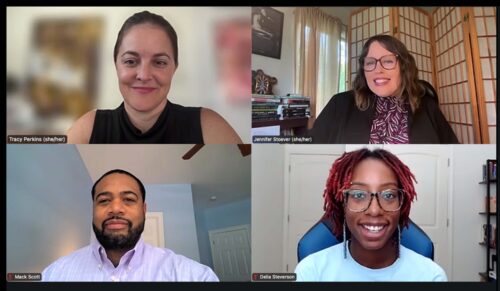Last month, Wiki Education’s Speaker Series kicked off the new academic year with the roundtable “Wikipedia & Social Justice: How students are enhancing representation and equity” featuring four professors from across the U.S. The scholars reflected on their experiences empowering students to improve Wikipedia while simultaneously exploring classroom conversations about knowledge equity, social justice, and the role of the online encyclopedia.
For panelist Mack Scott, visiting assistant professor of slavery and social justice at Brown University, incorporating the Wikipedia assignment into his courses like “This is America” and “Introduction to Native American and Indigenous Studies” gave students the chance to participate in a more meaningful project.
“Students have expressed how much they enjoy the assignment and how much harder they work on it,” said Scott. “They know that it’s not just me looking, and they feel the need to get it right – it adds more significance and more importance.”
When she first introduced the assignment in 2017 while teaching at Howard University, Arizona State University’s Tracy Perkins wanted to give her students a real-world project and a much larger audience for their coursework. She also recognized the opportunity to engage her students in discussions surrounding Wikipedia and social justice within the context of the course.

“Wikipedia has been a very rich place to talk with them about different forms of knowledge inequality and knowledge distortion, and how that happens, and where that happens in academia and the press in particular,” said Perkins, noting how similar dynamics influence what and how content is shared on Wikipedia.
Similar to Perkins, the other panelists use the assignment and the idea of Wikipedia itself to prompt powerful classroom dialogues. Delia Steverson, who specializes in 19th and 20th century African American literature at the University of Alabama, begins by asking her students a straightforward yet not-so-simple question: What is knowledge?
“How do we think we acquire knowledge?” said Steverson, continuing the line of questions she asks her students. “What does it mean to create knowledge? We have a very fruitful discussion about how and what we think about what actually is knowledge.”
Panelist Jennifer Stoever taught with the Wikipedia assignment for the first time this spring at Binghamton University, incorporating the project into her course “Black Women and Creativity.” Stoever challenged her students to consider how underrepresented histories have been kept out of the academic and media publications that serve as sources for Wikipedia articles.
“[My students] are like, well, why don’t oral histories count?” said Stoever. “And that took them a step even farther back into the production of knowledge and the politics of knowledge production – we had some really incredible conversations. History is only as equitable as its sources and its writers.”
Each panelist also emphasized how courses of all disciplines can engage in the work to improve representation on Wikipedia – not just those which explicitly cover social justice topics.
“Looking at knowledge production as a collective mission is key,” said Stoever.
Enhancing Wikipedia content related to historically underrepresented or misrepresented people and topics has been a driving force for Wiki Education since its inception, noted roundtable moderator Helaine Blumenthal, who manages the Wikipedia Student Program.
When emphasizing a reflection made by Scott, Blumenthal summed up the critical influence of Wikipedia and its contributors: “The way we write about the past affects how we think about the present.”
Catch up on our Speaker Series on our YouTube channel, including “Wikipedia & Social Justice: How students are enhancing representation and equity,” and join us for our next program tomorrow, October 24!
Open Source Tech: Building the Wiki Education Dashboard
Thursday, October 24 at 9:30 am Pacific / 12:30 pm Eastern
Interested in incorporating a Wikipedia assignment into your course? Visit teach.wikiedu.org to learn more about the free resources, digital tools, and staff support that Wiki Education offers to postsecondary instructors in the United States and Canada. Apply by December 1, 2024 for priority consideration for spring 2025.
